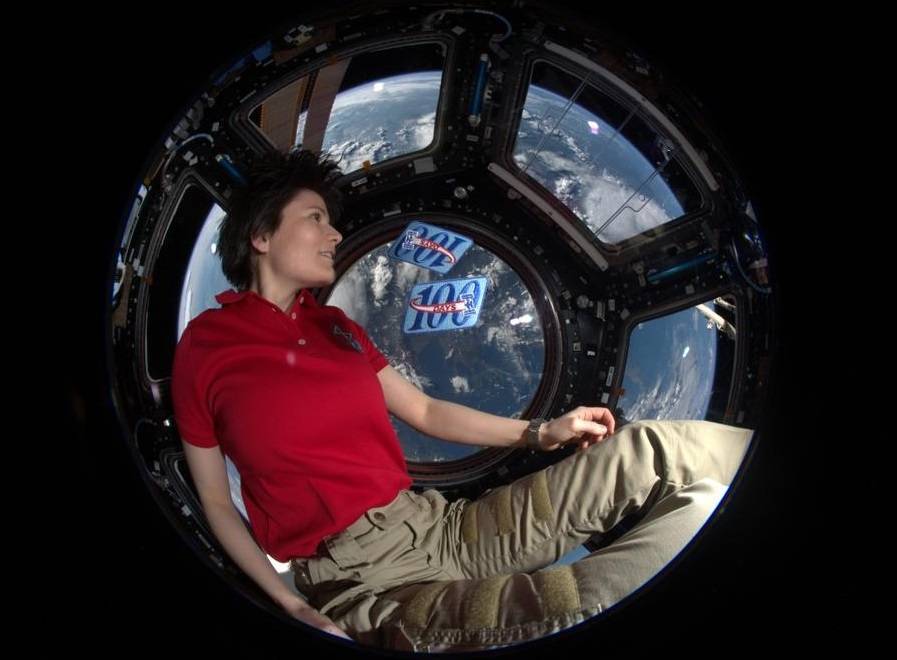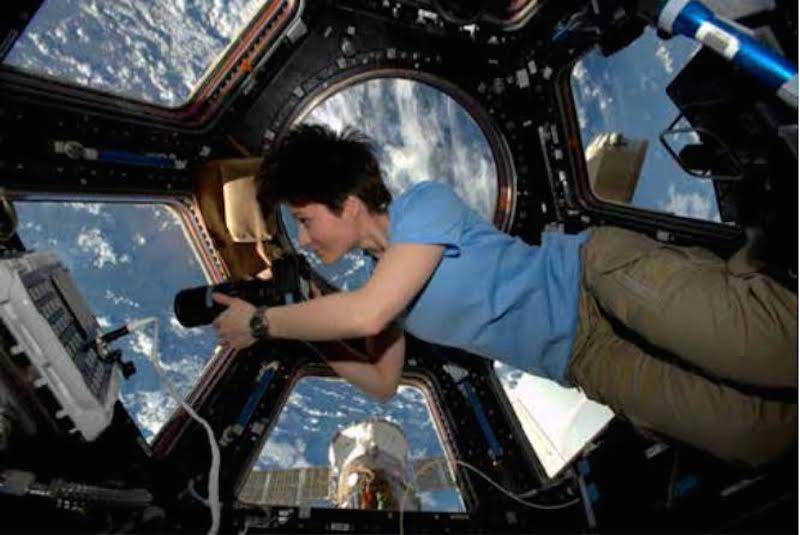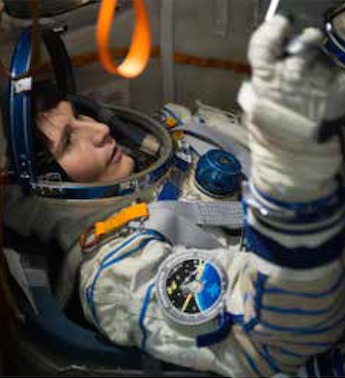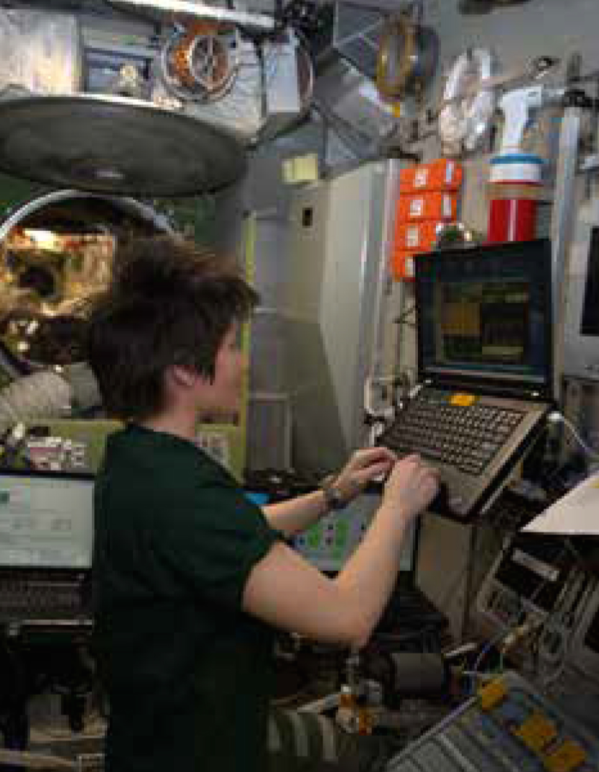Samantha Cristoforetti: Grounded in the Stars
We reached Samantha by phone, a three-party conference call connecting New York, Rome, and Geneva. Our first question had to be asked, especially for the other members of our generation, who began to dream in 1969 as they watched the first man walk on the moon.
How did it feel to touch down on earth after your amazing adventure in space?
A physical sensation prevails: there’s a violent impact with earth and then there’s a strong physical sensation – related to weight – after spending six months of floating weightlessly in the capsule. It’s tough to carry your whole body again, to lift objects. It’s all very tiring. I’d say that is the prevailing sensation.
How about after that physical sensation, when your emotions kicked in?
There’s not a specific moment when you feel overpowered by your emotions. It’s all very gradual, natural. There’s no moment when you say, “How will I ever handle all these feelings!”
Is it true you wanted to be an astronaut since you were a kid? What sparked the desire?
It’s totally true but I’m not sure what sparked it. In part the allure of the stars, in part the adventure, reading science fiction, teachers at school talking about astronomical geography. I think it was a combination of things.
Germany, America, Russia, France—you’ve traveled the world. How much of Italy still runs in your veins?
That’s tough to evaluate, to express in terms of percentages. Italy is the place I was born, where I grew up. I spent my entire childhood in Italy. It’s where I studied. I think that you carry that with you your whole life, even if, like me, the majority of your adult life has been spent outside Italy. But there’s no doubt Italy is a fundamental part of my identity.
What does it feel like to look at Italy from space?
It’s thrilling. Italy is easy to identify. It has a very well defined shape that is quite luminous in the dark. It’s particularly beautiful to see the country at night, looming above the Mediterranean. Often there are cloudless nights when you can see these beautiful reflections of the moon. There’s a special moon over the Mediterranean. Italy is one of the most picturesque views—not just for an Italian but for everyone, I think.
In 2009 you were selected by the European space agency. What was it like to realize your lifelong dream was beginning to take shape?
As I said before, it dawns on you gradually, not all of a sudden, since the selection process is very long. It lasted a year. People are cut at every stage of the process. By the final stage there were just ten of us and it was clear that at that point my chances were pretty good. It didn’t come as a surprise. Primarily I felt very relieved, because you’re there and you’ve almost made it and yet you’re still waiting for them to call and say yes or no. There’s always the chance you’ll have to bid your dreams goodbye. It was a relief, therefore, a great relief to receive the call. A ton of tension that accumulates in the days leading up to the call suddenly evaporates.
Did being a woman make it harder to realize this dream or were there other challenges?
I’ve never been a man, so it’s hard to compare…
What did you bring with you in space? Books? If so, which ones?
I brought a few books but I read next to nothing because up there you don’t feel like reading, since you can read elsewhere. I brought with me books with a symbolic value: Calvino’s Palomar, Saint-Exupéry’s Flight to Arras, Douglas Adams’ The Hitchhiker’s Guide to the Galaxy.
What’s on the menu in space? Freeze-dried food, we imagine…
Everything. The menu in space is a lot longer than you’d think… Sure, freeze-dried food, preserved food, meat.
Pasta?
Yeah, we had some pasta. Freeze-dried fusilli with shrimp. It really wasn’t that bad!
The whole world watched you making coffee in space. What did it feel like to do that, as an Italian?
I have to say it was more a pleasure to be able to drink coffee than a symbol of my Italian background. I mean, it would have been a wonderful gift for anyone who likes coffee.
It was fun to watch you doing that up there from down here…
Yes, it was very cute. And I’m happy for the team that made the coffee machine.
It wasn’t just a game or a publicity stunt. That should be clear. Everything you do in space, even an experiment like that, benefits research...
Right. It was seen less as an experiment and more like a small technological demonstration, since a liquid espresso machine at high temperatures and under high pressure is hard to make, and we made it in space partly to resolve a safety issue. A few technical solutions had to be invented to guarantee that the machine would be safe, that there wouldn’t be any accidents.
You wrote many tweets from space that became famous among young people too. Did you miss earth?
No, I didn’t. Maybe the one thing I missed was a warm shower; months of washing with damp towels doesn’t leave you feeling that clean. But besides that, I really enjoyed myself. Of course there are a lot of things on earth that are missing in space, but you’re not in space forever, so I didn’t concentrate on what was missing. Actually, I concentrated on having a good time in space. I’d be back on earth soon enough.
What was the dominant emotion you felt from up there on earth?
Every day there was something different. It’s a very particular aesthetic experience. It varies a lot. There isn’t one thing that ranks above another. In fact there is no ranking system.
Was it harder to adjust to space or when you came back to Earth?
Coming back to earth may have been more difficult. In part because in space you’re really buoyed by the fact that there’s this adventure beginning, it’s all one big discovery. I was very quick to adjust to it physically too. I was lucky in that regard; some astronauts are sick for days. I, on the other hand, didn’t experience any nausea. I felt well from the start. Space welcomed me with open arms.
What would you most like to do now, professionally speaking? What’s the next frontier? Last century, many people dreamed of setting foot on the moon, but then things turned out a little differently…
As far as long-term goals are concerned, I would like to go on a mission to the moon, to set foot on the moon by the end of the next decade. Before then, I hope to get the chance to go back to the space station. And I definitely don’t want to have to wait another ten years.
Generally speaking, what are the most important future missions in space?
Definitely to execute the [space shuttle] transition program well, and at the end of the space station program, return to exploring the moon. The mission is at hand, too, in the sense that if the space station should last until 2024, as we expect and hope, and if we want to avoid a gap between this program and lunar exploration, we have to start working now, find funding... And it must be a realistic, sustainable program that could bring us a step at a time to the end of the next decade to have missions with astronauts on the surface of the moon.
How has your family felt about your work?
They’ve been a bit worried at times, obviously, but deep down they’ve always been very happy.
Yet Samantha can’t remember when she first realized she wanted to become an astronaut. Nor when she told her parents. It was as if it was her destiny, written in the stars. “It’s something that you lose a little when you grow up,” she adds. “No one really remembers the first time. It’s as if that was always the way it was.”







































i-Italy
Facebook
Google+
This work may not be reproduced, in whole or in part, without prior written permission.
Questo lavoro non può essere riprodotto, in tutto o in parte, senza permesso scritto.